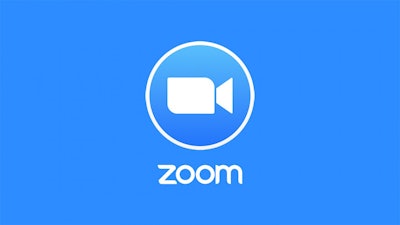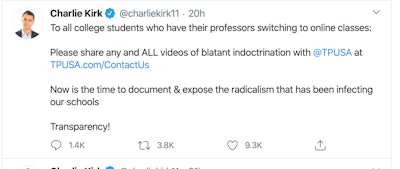After discovering she would have to defend her doctoral thesis online, because the coronavirus shut down her campus, Chaya Stern was disappointed. She had, after all, devoted six years to her Ph.D., all while being a first-generation student and mother of two. But as she watched the pandemic devastate her home of New York City, she understood the gravity of the situation and readied for her online defense.
Besides, she had live-streamed lectures before using Zoom and was familiar with the video conferencing platform which has now become the go-to online classroom tool for universities as the pandemic has shut down more than 200 campuses in the country.
As the days inched toward her defense, Stern’s excitement grew. Always a proponent of publicly-accessible science, she shared her defense’s Zoom link on Twitter, encouraging people to listen in.
On the day of her defense, before she could even move beyond her title slide, the harassment began. Internet trolls and racist hecklers decided to join her Zoom session and interrupt her thesis defense.
“I’m in the middle of talking and, all of a sudden, I see some red marks and I’m not sure what’s happening,” said Stern. “Then this person just writes the N-word across my title slide. I had no idea what was going on.”
The harassers proceeded to draw on her screen and make inappropriate jokes 
Stern’s experience is far from unique. The number of racist and vitriolic attacks on the video conferencing platform, now termed “Zoombombing,” have proliferated in the past two weeks as universities transition courses online due to the COVID-19 pandemic.
Just days prior to Stern’s defense, for instance, another first-generation student and Ph.D. candidate, Dennis Johnson, was in the midst of presenting his thesis defense when red marks appeared on his screen too, with attackers scribbling the N-word and posting pornographic pictures and videos.
“On one of my most remarkable moments of my life, I was called a ‘n****r’. My mother, grandmother, sister, spouse and many others were shown images of pornography,” Johnson, who’s at California State University, Long Beach, later wrote in a petition demanding Zoom address the hate speech on its platform.
As of Wednesday evening, the petition has garnered nearly 30,000 signatures, including Stern’s, as more and more schools — including the University of Texas at Austin, the University of Southern California and the University of California, Berkeley — continue to report racist and misogynistic attacks toward their students and faculty.
Meanwhile, for Dr. Jessie Daniels, author of Cyber Racism: White Supremacy Online and the New Attack on Civil Rights and a professor of sociology at CUNY’s Hunter College and the Graduate Center, the exponential rise in attacks, especially on Zoom, is far from surprising. Having studied the way racism materializes on the internet since the early 1990s, Daniels has described internet trolls and White supremacists as “innovation opportunists.”
“They track very closely where innovation is happening,” she said. “So when COVID-19 happened and, in a week or even less, higher education had to move online, the far right was paying attention, as we all were.” They saw that academics were “not aware of all the default settings and vulnerabilities of Zoom and they saw it as an opportunity.”
In other words, Daniels said, “They’re moving to Zoom, because we’ve all moved to Zoom.”
Based out of San Jose, California and created by Eric S. Yuan in 2011, Zoom Video Communications went public on the Nasdaq stock exchange last year and has since been thrust into the spotlight as universities scramble to teach courses online. In the past three months alone, Zoom’s shares have risen about 145%, even as the S&P 500 declined 20% within that same time frame.

Plus, users don’t have to create a Zoom account to join a meeting, unlike with Skype, which still requires users to download the app and create their own accounts. Besides, Skype hasn’t been updated since August, partly because it is owned by Microsoft which has been investing most of its energy in Microsoft Teams, explained technology journalist Alex Lee, who has criticized Teams for being a “confusing, buggy mess.”
As a result, it appears Zoom has landed on top. Or, as one New York Times headline put it: ‘We Live in Zoom Now.’
It’s not difficult to join a Zoom meeting even if you aren’t invited. Search “zoom.us” on Twitter, and countless links to meetings will appear, making it easy for unknown harassers to participate.
In effect, part of Zoom’s response has been asking its users not to share their meeting links with the public. But for academics like Stern, who want their scientific research to reach a broad audience, that solution only puts a Band-Aid on a gaping wound.
For people like Daniels, who are interested in why racist trolls specifically attack academia, privatizing public lectures only emboldens the motives of many White supremacists.
“The far right is always looking for some new technology as an opportunity to spread their ideology, to undermine values that they don’t believe in,” Daniels said. “And higher ed is a real target for the far right because we are so digital, so public and so unprotected. We go against everything that they say they believe in. We teach people to think critically and that’s the greatest threat to them.”
Daniels referred to a tweet from Charlie Kirk, the leader of Turning Point USA, a conservative organization dedicated to “uncovering liberal bias” on university campuses.
On Twitter, Kirk wrote, “To all college students who have their professors 
“That was a kind of clarion call to the far right,” said Daniels. “And then it was game on.”
Though the FBI in Boston has classified Zoombombing as “video-teleconferencing hijacking,” which is illegal, acting against such attacks is tricky for law enforcement, said Daniels. Instead, she argued platforms need to be held accountable.
“We should hold the platform accountable for this type of damage that it’s facilitated. It’s the platform’s fault and it shouldn’t be left to individual users who are making Zoom millions, if not billions, of dollars right now,” said Daniels. “It shouldn’t be incumbent on the individual user to have to pay attention to the default settings that are deep within the platform.”
Dr. Ruha Benjamin, an associate professor of African American studies at Princeton University and author of Race After Technology, has publicly called on Zoom to change its default screen sharing settings to “off,” providing hosts with the power to select who can share their screens.
So far, Zoom has published a blog sharing ways to “keep the crashers out of your Zoom event,” suggesting that hosts enable the “Waiting Room” feature so they can approve people into the meeting, one by one, or that they disable screen sharing in “Advanced Sharing Options.” It has also asked that users report incidents as soon as they happen.
Other schools, such as the University of Southern California and the University of California, Berkeley, have released similar guides to prevent Zoombombing.
Stern, who had alerted her school days prior to the defense that attacks had been happening, says it’s now the responsibility of faculty to familiarize themselves with these guidelines and the intricacies of the platform.
“Whoever is hosting has to spend time learning this; it’s their job now,” said Stern. “Graduate schools need to ensure that they know how to deal with this technology. So much has already been taken away because of this and then having this happen is extremely upsetting. It’s just disgusting.”
Though the attacks occur online, Daniels said people shouldn’t consider them any less severe than if they were to occur in person. Quoting the legal scholar Patricia Williams’ term ‘spirit-murdering,’ Daniels highlighted the equally damaging toll online harassment takes on a person’s well being.
“A lot of times, people’s response is to say, ‘Well, it’s just words, sticks and stones,’” Daniels said. “But that dismisses the unique kind of pain that a racial epithet hurls, because it goes against someone’s very being.”
For that reason, “We shouldn’t dismiss these attacks as less serious or less harmful because they happened in Zoom rather than a physical brick and mortar classroom.”


















